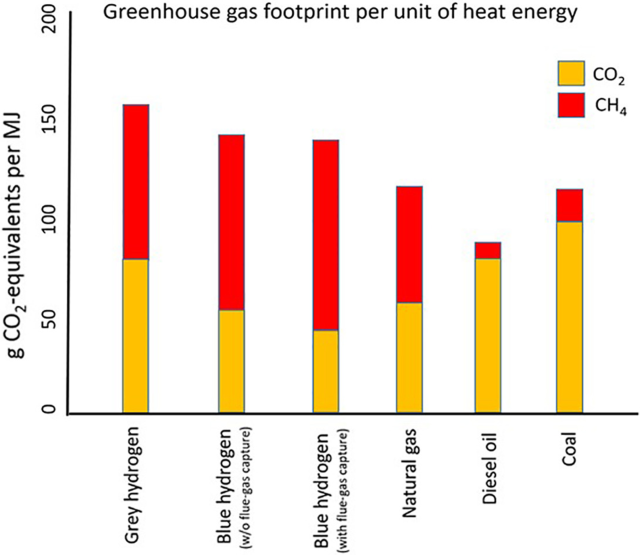“Blue” hydrogen is worse for the climate than coal, study says
Findings could throw national climate policies into disarray.
Gas companies and utilities are in a pickle. Their entire business model relies on the extraction, transport, and combustion of methane, one of the most potent greenhouse gases known to humankind. With many countries aiming to reach net-zero emissions by 2050, these companies face an uncertain future.
One solution they’ve proposed is slipping hydrogen into their distribution lines, either partially or fully replacing natural gas, so that people can burn it to heat their homes or generate electricity. When produced using solar and wind power, hydrogen is a zero-carbon fuel, and while refitting natural gas infrastructure would be expensive, it would give gas-only utilities a reason to exist.
The problem is that producing so-called “green” hydrogen is expensive and will remain so for a decade or more, according to forecasts. . .
 To buy themselves time, utilities and oil and gas companies have proposed producing hydrogen from natural gas. Most hydrogen today is made by exposing natural gas to high heat, pressure, and steam in a process that creates carbon dioxide as a byproduct. In what’s called “gray” hydrogen, all that carbon dioxide is released into the atmosphere.
To buy themselves time, utilities and oil and gas companies have proposed producing hydrogen from natural gas. Most hydrogen today is made by exposing natural gas to high heat, pressure, and steam in a process that creates carbon dioxide as a byproduct. In what’s called “gray” hydrogen, all that carbon dioxide is released into the atmosphere.
In “blue” hydrogen, facilities capture the carbon dioxide and sell it or store it, usually deep underground.
Blue hydrogen is viewed by some as a bridge fuel, a way to build the hydrogen economy while waiting for green hydrogen prices to come down. In the meantime, blue hydrogen is also supposed to pollute less than gray hydrogen, natural gas, or other carbon-intensive fuel sources.
Except blue hydrogen may not be low-carbon at all, according to a new peer-reviewed study.
In fact, the study says the climate may be better off if we just burned coal instead. Now that is something to ruminate about __________________
Questionable policies
The new carbon accounting may undermine some countries' climate plans, . .
The new study also casts doubt on some plans to shift transportation to hydrogen.
Some sectors, like freight and aviation, may end up requiring hydrogen for certain routes.
But cars and trucks, which many countries say must be zero-emitting by 2035 or sooner, will have a harder time justifying a switch to hydrogen over straight electrification.
Companies that have bet their future on hydrogen, like Toyota, are in a tight spot as their bridge to a truly zero-carbon portfolio takes a hit.
Not all hydrogen suffers from these problems, of course. Green hydrogen, which is made by splitting water using wind or solar power, doesn’t suffer from the same carbon accounting issues.
> But neither does it reuse oil and gas companies’ existing infrastructure.
So while this new study seems to be a pretty damning indictment of blue hydrogen, it’s unlikely to be the final nail in its coffin."
RELATED CONTENT ON THIS BLOG from June 13, 2019
 Embedding Sustainability in Real Estate Transactions
Embedding Sustainability in Real Estate Transactions
"Acquisitions and dispositions present a significant opportunity to create value through investments in energy efficiency, health, and building resilience. Understanding the potential value of a high-performing, sustainable building allows buyers and sellers to better assess and price the deal going in, to underwrite sustainability investments to drive higher returns, to market the value created by these investments to tenants, and to communicate this value to buyers when buying or selling an asset.
The potential value at stake for embedding sustainability is significant, and in some cases can represent a 50 percent–plus increase in asset value over the lifetime of an investment.
This ULI toolkit provides guidelines on how to incorporate the value of sustainability in transactions.
It includes best practices from more than 30 ULI real estate leaders actively involved in real estate transactions."
READ MORE > Urban Land Institute
_______________________________________________________________________
Blogger Note: Keep in Mind F.I.R.E
- Finance
- Insurance
- Real Estate
============================





No comments:
Post a Comment